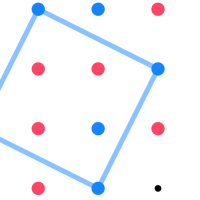
Creating squares
This game, from our sister site Wild Maths, is trickier than it looks. Take turns marking dots on the grid to create a square. The player to create the first square wins. You can play against a friend or against the computer.
You can find many other games, puzzles and other maths resources on Wild Maths, a site which encourages students to explore maths beyond the classroom and is designed to nurture mathematical creativity.
John76923
Suppose X is player 1 and Y is player 2 and the moves are x1 ... y1, x2 ... y2 etc where each of the xi and yj are pairs of co-ordinates (here represented as a single symbol).
Suppose Y, the second player, has a winning strategy y1 ... yn irrespective of what X does.
Then all that X ever had to do was to have adopted the same sequence as x1 ... xn and X would win before Y.
This argument sketches over a few details, but the key point is that X's initial extra move can never act as a hindrance to X, only as a bonus offering further chances of a square. It increases opportunities for X whilst introducing no extra risks or vulnerabilities.
But must the game end in a win for somebody? Is stalemate possible?